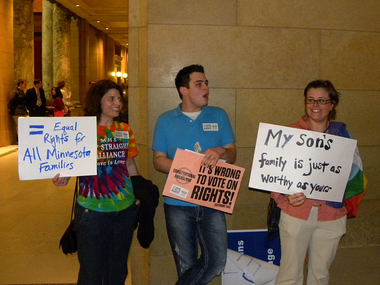Group to push legal gay marriage in Minnesota

PATRICK CONDON, Associated Press
ST. PAUL, Minn. (AP) — The leader of the campaign that defeated a gay marriage ban in Minnesota said Thursday the group would now push to legalize gay marriage in the legislative session that starts next month.
Richard Carlbom told The Associated Press that he would continue to lead Minnesotans United for All Families, which will transform into a lobbying group that will urge Minnesota lawmakers in 2013 to pass a bill legalizing gay marriage. It's the first time the group has said it would push for gay marriage so soon after voters rejected the proposed constitutional ban in November's election.
"Minnesotans were asked whether we should limit the freedom to marry in the last campaign, and they resoundingly said no," Carlbom said. "We believe it's time to move forward from that."
The marriage amendment went down with 47 percent of the vote in November, short of the majority needed to cement it in the state constitution. But gay marriage continues to be prohibited under state law. With Democrats set to take over the Legislature in January and gay marriage supporter Mark Dayton occupying the governor's office, Minnesotans United has a much more direct path to adding Minnesota to the growing list of U.S. states that allow same-sex couples to wed.
Still, since the election Dayton and Democratic leaders in the Legislature have been reluctant to embrace a gay marriage push in 2013. They have said eliminating a $1.1 billion state budget deficit is the greater priority, and even some Democrats who support gay marriage rights say the party runs the risk of seeming preoccupied with social issues if lawmakers immediately start considering gay marriage.
The group that pushed the gay marriage ban, Minnesota for Marriage, is certain to fight its legalization. Leaders of the group held a strategy session with supporters this week, and on Thursday sent out a fundraising appeal anticipating the coming clash.
"Yes, we lost a battle, but the fight to preserve marriage is not over," Minnesota for Marriage chairman John Helmberger wrote in the fundraising letter. He pointed out that despite the amendment's defeat, it was supported by a majority of voters in 75 of the state's 87 counties. Its defeat is largely attributable to the fact that it failed by wide margins in most of the state's most populous counties.
That dynamic could prove a particular challenge for gay marriage supporters trying to line up Democratic votes. In all, 27 Democrats in the Legislature represent districts where the amendment had majority support from voters — making a "yes" vote for gay marriage a dicey proposition for them. At the same time, 29 Republicans represent mostly suburban districts where the amendment failed — giving gay marriage supporters an opening to try to build bipartisan support for their bid.
Carlbom said gay marriage supporters know they have an uphill battle at the Capitol.
"I do not by any stretch presume we have a mandate," Carlbom said. "I think we still have a lot of work to do to spark conversation about why marriage matters, and why we shouldn't limit the freedom to marry. But at the end of the day, voters will reward those who grant freedom and punish those who try to limit it."
Carlbom said the new Minnesotans United is in the very early stages of forming its legislative strategy, and wasn't sure what form it would take. Two Democrats, Roseville Sen. John Marty and St. Paul Rep. Alice Hausman, have already said they intend to immediately introduce a bill to legalize gay marriage when the Legislature convenes on Jan. 8.
Ten U.S. states and the District of Columbia allow marriage between same-sex couples. The three to join the list most recently were Maine, Maryland and Washington, where voters in November supported measures to legalize gay marriage. Those wins, as well as Minnesota's defeat of the amendment, were the first statewide electoral victories for the gay marriage movement after over a decade of more than 30 consecutive losses.





